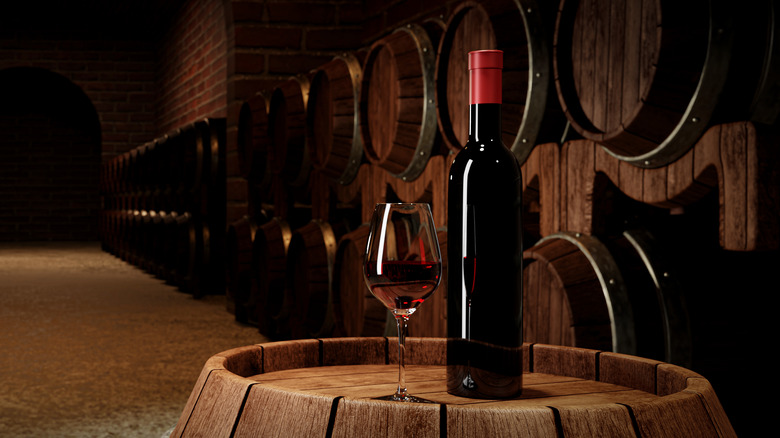Why A Dark Wine Cellar Isn't The Best Place For Tastings
If you've ever been to a wine tasting at the vineyard where the wine was produced, you've likely been led into the dark, cavernous cellars where the precious liquid was aging in barrels and bottles. Vintners are usually delighted to show guests where the magic happens, and, more often than not, have a pre-set table with some of the vineyard's best wines laid out for your delight. Yet, as atmospheric as the cellar may be, it is not, sadly, the best place for a proper wine tasting.
Noted wine critic James Suckling says there are two main reasons he does not prefer wine tasting in dark cellars: color and concentration (via MasterClass). As cellars are not well-lit and tend to have closed quarters, it can be difficult for the discerning taster to make an opinion on the wine. Light is important, especially when considering the color of the wine. Noise can also have an effect, because noise levels often reduce concentration, thereby making it all the more difficult for you to make a calculated consideration.
So, for all the ambiance of a dimly lit cellar filled with racks of wine bottles and large, oaken barrels, it's not really the best place to get the full experience of tasting wine. The color component, in particular, is of great importance as it serves as your introduction to the wine you're tasting.
Why color is important
The reason you need ample light in order to properly judge a wine is that color is an indicator of the wine's quality before you've even tasted it. It's the first thing we see coming out of the bottle.
Color tells you a lot about wine. Reds, rosés, and whites all have their own unique colors that distinguish them. Red wines, in particular, can communicate their age and mouthfeel to the drinker based solely on the color of the liquid. As wine ferments, its color is drawn and strengthened from the grape skins, juices, acids, and sugar that come together to make the alcohol. The reductive strength of certain wines allows them to take in more oxygen, and therefore more color, without oxidizing or fermenting into vinegar. This is not something that you, as a standard wine drinker, would necessarily take into consideration. But vintners and wine critics understand these principles very well. The deep or shallow color of wines can instantly provide an idea of the nature of the wine before it is consumed.
If you prefer ambiance, the environment of the dark cellar shouldn't bother you in the slightest. If, however, you are a very serious wine drinker fascinated by the science and further understanding of the tasting process, it really isn't the right environment for you.

